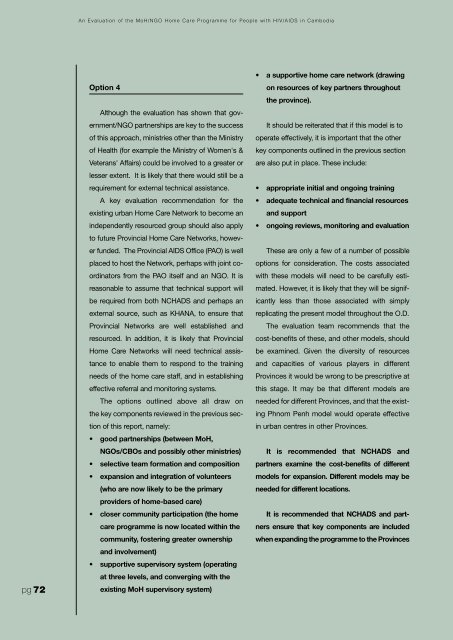PDF File - hivpolicy.org
PDF File - hivpolicy.org
PDF File - hivpolicy.org
- No tags were found...
You also want an ePaper? Increase the reach of your titles
YUMPU automatically turns print PDFs into web optimized ePapers that Google loves.
An Evaluation of the MoH/NGO Home Care Programme for People with HIV/AIDS in Cambodiapg 72Option 4Although the evaluation has shown that government/NGOpartnerships are key to the successof this approach, ministries other than the Ministryof Health (for example the Ministry of Women's &Veterans' Affairs) could be involved to a greater orlesser extent. It is likely that there would still be arequirement for external technical assistance.A key evaluation recommendation for theexisting urban Home Care Network to become anindependently resourced group should also applyto future Provincial Home Care Networks, howeverfunded. The Provincial AIDS Office (PAO) is wellplaced to host the Network, perhaps with joint coordinatorsfrom the PAO itself and an NGO. It isreasonable to assume that technical support willbe required from both NCHADS and perhaps anexternal source, such as KHANA, to ensure thatProvincial Networks are well established andresourced. In addition, it is likely that ProvincialHome Care Networks will need technical assistanceto enable them to respond to the trainingneeds of the home care staff, and in establishingeffective referral and monitoring systems.The options outlined above all draw onthe key components reviewed in the previous sectionof this report, namely:• good partnerships (between MoH,NGOs/CBOs and possibly other ministries)• selective team formation and composition• expansion and integration of volunteers(who are now likely to be the primaryproviders of home-based care)• closer community participation (the homecare programme is now located within thecommunity, fostering greater ownershipand involvement)• supportive supervisory system (operatingat three levels, and converging with theexisting MoH supervisory system)• a supportive home care network (drawingon resources of key partners throughoutthe province).It should be reiterated that if this model is tooperate effectively, it is important that the otherkey components outlined in the previous sectionare also put in place. These include:• appropriate initial and ongoing training• adequate technical and financial resourcesand support• ongoing reviews, monitoring and evaluationThese are only a few of a number of possibleoptions for consideration. The costs associatedwith these models will need to be carefully estimated.However, it is likely that they will be significantlyless than those associated with simplyreplicating the present model throughout the O.D.The evaluation team recommends that thecost-benefits of these, and other models, shouldbe examined. Given the diversity of resourcesand capacities of various players in differentProvinces it would be wrong to be prescriptive atthis stage. It may be that different models areneeded for different Provinces, and that the existingPhnom Penh model would operate effectivein urban centres in other Provinces.It is recommended that NCHADS andpartners examine the cost-benefits of differentmodels for expansion. Different models may beneeded for different locations.It is recommended that NCHADS and partnersensure that key components are includedwhen expanding the programme to the Provinces
















